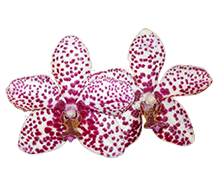When to Repot an Orchid
Repotting orchids is essential to their continued good health and growth. If an orchid remains in the same medium for a very long time the plant will decline. Over time orchid medium decays and compacts and smothers the roots. The amount of time between repotting varies with the type of orchid, and the type of medium. In general, an orchid should be repotted regularly. Paphiopedilums and Phalaenopsis benefit from more frequent repotting. A coconut husk mix will last longer than a fir mix and sphagnum moss falls somewhere in the middle.
The following considerations apply to choosing when to repot an orchid.
For a newly acquired orchid, many orchidists like to repot as soon as practical. This may mean waiting until the orchid has gone out of bloom if the plant was acquired while blooming. The benefit here is to repot the orchid in a medium that is in harmony with the rest of the orchids in the collection. This also provides an opportunity to see the plant's roots and in so doing get a better handle on the overall health of the plant. In some cases orchids are potted up in overly large pots for sale that really should be in smaller pots. This is seen most often with orchids that are produced for the pot plant market and sold at hardware and grocery stores .
For an orchid that is not newly acquired, the optimal time to repot is after the plant has bloomed and is beginning a new growth cycle. The emergence of a new leaf, new roots, or a new pseudobulb signals this time. As this new growth cycle begins we consider whether the orchid will require repotting before this time comes again. For many orchids we can get them on a steady every other year cycle.
An orchid should be repotted if the growth for the next cycle is climbing over the edge and out of the pot. As a practical matter, orchid roots that grow outside the pot have a tendency to get bumped and broken or to attach themselves firmly to the outside of the pot or to neighboring pots. To keep this kind of scraggly growth controlled, repot and position the orchid so that it can grow for a year or two before climbing out of the pot again.
Repotting may be required if an orchid has gotten infested with bugs. If bugs keep recurring it is sometimes because they have taken their operations underground and are munching on the roots or have set up shop in the media. Removing all of the old mix, carefully cleaning and examining the roots and repotting in fresh mix is often a critical step in eradicating a persistent pest issue.
If a plant is declining we sometimes need to pull it out of its pot to see what is going on. Unfortunately, if a plant is declining its root system is likely reducing and the plant may now be in too big of a pot. Because repotting places some stress on an orchid we are often hesitant to repot an orchid that is declining. However, not repotting the orchid may result in even more stress. This is where experience and judgement come into play, the course of action with a declining plant is rarely clearcut. Increasing light levels will sometimes bring an orchid out of the doldrums, so will repotting. Repotting is especially beneficial when in hindsight we know that the orchid's roots had rotted and the plant really needed new medium and a smaller pot.
We offer some basic guidelines on when each type of orchid should most likely require repotting in our Repotting Calendar. It is common for orchids to occasionally bloom off cycle and not follow the calendar. When this happens we follow the plant's lead on when to repot.










